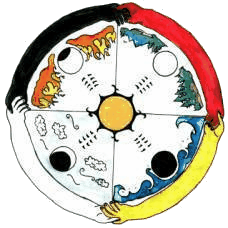
|
http://www.denverpost.com/cda/article/print/0,1674,36%257E150%257E1696318,00.html Denver Posted quillen
Better than Columbus Day
Tuesday, October 14, 2003 - Columbus Day was Sunday, but it was officially celebrated yesterday as a federal holiday, and celebrated in Denver on Saturday in a manner which has become a modern tradition: a confrontation.
On one side are activists, many of them Native Americans, who argue that it would be just as proper to celebrate a Hitler Day or a Stalin Day. On the other are upholders of tradition, who point out that Christopher Columbus was a great sailor who forever changed the course of world history. Complicating matters further is that Columbus Day is also a sort of "Italian-American Heritage Celebration Day." Looking to history isn't much help here, because you can find proof for just about any argument you want to advance. But we can start by observing that Columbus did not arrive in the New World with noble intentions. He was not sailing to prove that the world was round - educated people of the time already knew that. Nor was he sailing to add to the sum of human knowledge by discovering new places, plants and animals. He was aiming for a known place, and when he found land, he thought he was near India, and hence the people must be "Indians." He had embarked in the hope of establishing a profitable trade route. But as soon as he encountered the Taino people on Guanahani (their name for an island that might be San Salvador), he observed "how easy it would be to convert these people - and to make them work for us." That is, he wanted to enslave them. But it seems rather racist to assume that only Europeans knew the arts of imperialism, warfare and enslavement. The Taino might "invite you to share anything that they possess, and show as much love as if their hearts went with it," Columbus wrote, while "living simply and innocently without enforcement of laws, without quarreling, judges and libels, content only to satisfy nature." But the Taino people had also taken the Bahamas and most of Cuba from the Siboney people within the preceding century. When Columbus landed on American soil (Puerto Rico on his second voyage in 1493), the large village at Anasco Bay was deserted. That's because the local Arawak band maintained lookouts for invading fleets of Carib war canoes, and when they saw the ships approach, they fled into the hills. We don't even have to get to the imperialistic Aztecs and Incas to see that the New World was not some idyllic Eden before Columbus arrived. Nor would it have mattered much, in the general scheme of world history, if Columbus had never sailed. The times and the technology were ripe for such expeditions. The eminent naval historian Samuel Eliot Morison speculated that if there had been no Columbus, then a Portuguese sailor, Pedro Alvares Cabral, would likely have "discovered" America in 1500. At any rate, Columbus was no saint, and he was such a disaster as a colonial administrator that in 1500 he was returned to Spain in chains. But he was a skillful mariner who never lost a sailor at sea. So how did Columbus get his name on an American holiday? According to the U.S. Information Service, "America might not have a Columbus Day if Christopher Columbus had not been born in Italy. Out of pride for their native son, the Italian population of New York City organized the first celebration ... on Oct. 12, 1866. The next year, more Italian organizations held banquets, parades and dances on that date. In 1869, when Italians of San Francisco celebrated Oct. 12, they called it Columbus Day." On the 400th anniversary, in 1892, President Benjamin Harrison urged Americans to celebrate the day, and the Library of Congress reports that, "Over the following decades, the Knights of Columbus, an international Roman Catholic fraternal benefit society, lobbied state legislatures to declare Oct. 12 a legal holiday." In 1905 or 1907 (the accounts vary), Colorado was the first state to make Columbus Day a state holiday. In ways, that's surprising, because Italian immigrants were a despised group in Colorado. In Gunnison in 1890 and in Denver in 1893, Italians were lynched. A century ago, Salida newspapers often demanded action against "the thieving dagos" who hung around the railroad yards. When the Ku Klux Klan nearly gained control of our state government after the 1924 election, the Klan was not anti-black or anti-Jewish so much as it was anti-Italian. Crosses were burned in Salida and Canon City on Italian lawns, and in Pueblo, the Klan led violent raids on wine-making Italians who were violating Prohibition - that era's war on controlled substances. So in ways, Italian-Americans and Native Americans share a history of oppression in Colorado. Colorado was the first state to make Columbus Day an official holiday, and now we could be the first state to replace it with a celebration that would inspire people to march together - something like Endurance Day or Persistence Day. Ed Quillen of Salida (ed@cozine.com) is a former newspaper editor whose column appears Tuesday and Sunday. |